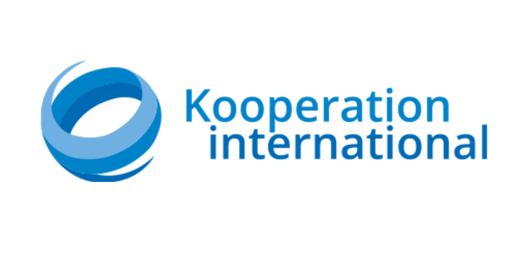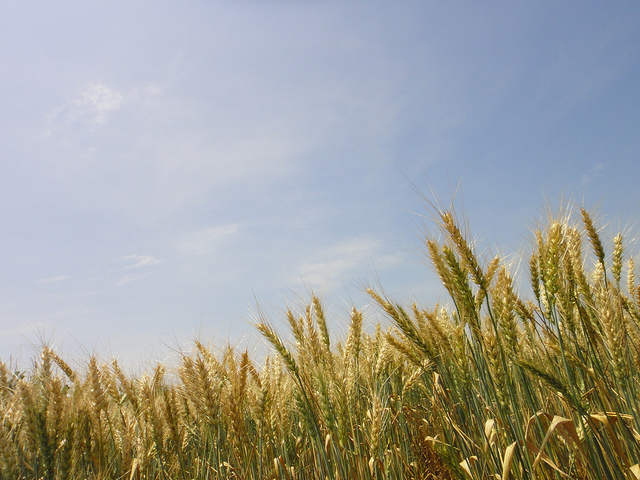 FOR IMMEDIATE RELEASE
FOR IMMEDIATE RELEASE
Frankfurt, Germany – December 9, 2014 – Wild ancestral relatives of wheat will play a key role in fortifying the world’s food supply as climate change warms the planet, according to a team of top scientists.
Heat and drought are already a major cause of wheat yield losses in both developing and developed countries, a situation that scientists predict will worsen due to warmer temperatures and erratic rainfall patterns caused by global climate change. Some of the potential risks were demonstrated in 2003, when farmers in France lost nearly a quarter of their crop due to an unusually hot growing season.
More than 100 plant scientists from 22 major wheat-growing countries in the global south and north, met last week to discuss an ambitious international plan to incorporate the most advanced genetic technologies into traditional plant breeding to improve heat and drought tolerance of wheat.
“Not only are the livelihoods of farmers at risk from climate change, but people living in some of the world’s most vulnerable areas could see entire food supplies wiped out with increasing frequency if we don’t act quickly to boost the resilience of wheat to heat waves and more extreme periods of drought,” said Matthew Reynolds, a distinguished scientist at the International Maize and Wheat Improvement Center (CIMMYT), who co-organized the three-day Heat and Drought Wheat Improvement Consortium (HeDWIC) meeting.
“A new generation of plant screening and molecular technologies can speed up our capacity to transfer stress-tolerance traits into new wheat varieties. Wild relatives of wheat, which evolved in hot and dry places, will provide the crucial genes we need for crop improvement,” Reynolds added.
Findings in a report released earlier this year by the Intergovernmental Panel on Climate Change (IPCC) state it is very likely that heat waves will occur more often and last longer throughout the 21st century and rainfall will be more unpredictable.
Mean surface temperatures could potentially rise by between 2 to 5 degrees Celsius or more, despite efforts to limit the global rise in temperature to 2 degrees Celsius, the report said.
Wheat – a major staple crop, which provides 20 percent of calories consumed worldwide and is an important source of protein especially for poor consumers– is expected to be subject to dramatic increases in temperature and more variable and extreme precipitation, particularly in tropical and semi-tropical regions.
“The risks to food security will be highest for people living in vulnerable parts of Africa and Asia, but will affect the disadvantaged and low-income communities in every country,” Reynolds said.
Adaptation can play a key role in reducing potential socio-economic shocks caused by climate change.
HeDWIC, launched in 2014 by the Global Agricultural Research Partnership (CGIAR) Research Program on Wheat, is a multi-disciplinary, 15- to 20-year global partnership serving as a vehicle for plant scientists to address these food security challenges. In its initial stages, it will be funded by the CGIAR Research Program on Wheat, and attract support from other public and private sector donors.
The meeting was organized by CIMMYT, CGIAR’s lead research center for wheat, part of a global coalition that includes CGIAR’s International Centre for Agricultural Research in the Dry Areas (ICARDA), and shares a mandate to deliver new wheat cultivars to resource-poor farmers. It was co-sponsored by Bayer CropScience, which has heavily invested in wheat breeding as part of its overall mission to provide agricultural technologies for professional farmers and growers.
Co-organizers of the event included the Julius Kuehn Institute (JKI), Germany’s Federal Research Centre for Cultivated Plants affiliated with the country’s Federal Ministry of Food and Agriculture, and the international public-private Wheat Initiative coalition.
“The meeting was a good example of the private and public sectors working together to solve a common problem,” said Hans Braun, director of CIMMYT’s Global Wheat Program.
“We’ve laid the foundations for a successful research venture that will help farmers and many of the world’s most marginalized people living in some of the most difficult environmental conditions. From here, we’ll produce a comprehensive road map,” he said.
Representatives from international development and science funding agencies also attended the three-day meeting
Contacts:
Matthew Reynolds
Distinguished Scientist
International Maize and Wheat Improvement Center (CIMMYT)
Email: m.reynolds@cgiar.org
Julie Mollins
Wheat Communications Officer
International Maize and Wheat Improvement Center (CIMMYT)
Telephone: +52 (55) 5804 2004
Email: j.mollins@cgiar.org
Address:
International Maize and Wheat Improvement Center (CIMMYT)
Km. 45 Carretera México Veracruz
El Batán, Texcoco
Estado de México, C.P. 56237
About the International Maize and Wheat Improvement Center (CIMMYT)
CIMMYT, headquartered in El Batan, Mexico, is the global leader in research for development in wheat and maize and wheat- and maize-based farming systems. CIMMYT works throughout the developing world with hundreds of partners to sustainably increase the productivity of maize and wheat systems to improve food security and livelihoods.
CIMMYT is a member of the CGIAR Consortium and leads the Consortium Research Programs on Wheat and Maize. CIMMYT receives support from national governments, foundations, development banks and other public and private agencies.
CIMMYT wheat research: https://www.cimmyt.org/en/what-we-do/wheat-research
Additional links:
JKI: http://www.jki.bund.de/en
ICARDA: http://www.icarda.org/
CGIAR: http://www.cgiar.org/
Wheat: http://www.wheat.org
Bayer CropScience: http://www.cropscience.bayer.com/
Wheat Initiative: http://www.wheatinitiative.org/
IPCC: http://www.ipcc.ch

 Climate adaptation and mitigation
Climate adaptation and mitigation 